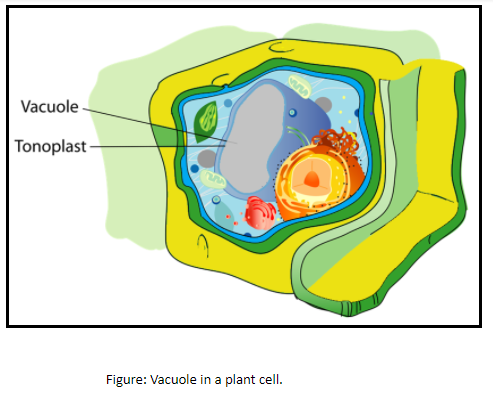
Why do plants possess large-sized vacuole?
(a)Storage
(b)Dumping of cellular waste
(c)Maintaining turgidity in cell
(d)All of the above
Answer
592.2k+ views
Hint: Vacuoles simply mean about a vacant space and are found in all the Eukaryotic cell types. In-plant cells, there is a single large central or sap vacuole, filled with cell sap, and is helpful for various purposes.
Complete answer:
Vacuoles of plants are like storage bubbles, which are found mostly in plant cells. They occupy most of the portion of the plant cells. The vacuoles perform the storage of food or water, removal of toxic metabolic by-products or end products of plant cells, and maintenance of osmotic pressure and turgidity due to the presence of cell sap. These are very vital processes of cell maintenance.

Additional Information: -A vacuole is formed of two parts:
1. Tonoplast: it is the outer, single-layered, unit membrane, and semipermeable.
2. Cell sap: It is the liquid present inside the central vacuole and is formed of water, minerals, sugars, amino acids, proteins, esters, anthocyanins, glucosides, alkaloids, organic acids, etc.
-Vacuoles help in the elongation of the cell.
-The maximum amount of water is stored in the vacuole.
-The vacuoles can be modified to perform different functions such as a food vacuole, contractile vacuole, or a gas vacuole.
So, the correct answer is, ’All of the above.’
Note: The toxic wastes are removed from the vacuole through the process of exocytosis. Exocytosis is a form of active transport (an energy-dependent process) and bulk transport in which a cell transports molecules (e.g., waste and proteins) out of the cell.
Complete answer:
Vacuoles of plants are like storage bubbles, which are found mostly in plant cells. They occupy most of the portion of the plant cells. The vacuoles perform the storage of food or water, removal of toxic metabolic by-products or end products of plant cells, and maintenance of osmotic pressure and turgidity due to the presence of cell sap. These are very vital processes of cell maintenance.

Additional Information: -A vacuole is formed of two parts:
1. Tonoplast: it is the outer, single-layered, unit membrane, and semipermeable.
2. Cell sap: It is the liquid present inside the central vacuole and is formed of water, minerals, sugars, amino acids, proteins, esters, anthocyanins, glucosides, alkaloids, organic acids, etc.
-Vacuoles help in the elongation of the cell.
-The maximum amount of water is stored in the vacuole.
-The vacuoles can be modified to perform different functions such as a food vacuole, contractile vacuole, or a gas vacuole.
So, the correct answer is, ’All of the above.’
Note: The toxic wastes are removed from the vacuole through the process of exocytosis. Exocytosis is a form of active transport (an energy-dependent process) and bulk transport in which a cell transports molecules (e.g., waste and proteins) out of the cell.
Recently Updated Pages
Master Class 11 Computer Science: Engaging Questions & Answers for Success

Master Class 11 Business Studies: Engaging Questions & Answers for Success

Master Class 11 Economics: Engaging Questions & Answers for Success

Master Class 11 English: Engaging Questions & Answers for Success

Master Class 11 Maths: Engaging Questions & Answers for Success

Master Class 11 Biology: Engaging Questions & Answers for Success

Trending doubts
One Metric ton is equal to kg A 10000 B 1000 C 100 class 11 physics CBSE

There are 720 permutations of the digits 1 2 3 4 5 class 11 maths CBSE

Discuss the various forms of bacteria class 11 biology CBSE

Draw a diagram of a plant cell and label at least eight class 11 biology CBSE

State the laws of reflection of light

Explain zero factorial class 11 maths CBSE




